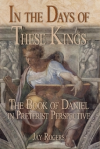POSTMILLENNIALISM IN THE GOSPELS (3)
PMW 2024-098 by Kenneth L. Gentry, Jr.
Having well-introduced the presence of the postmillennial hope in Jesus’ teaching in the Gospels, we now come to his formally commissioning his disciples for world-wide dominion. Christianity is not to end up like the Essenes in Qumran: a brief blip in religious history destined to quickly fade away. Christ is establishing his kingdom for the long run, as we can see in the Great Commission
As a king ruling over a kingdom destined to grow, the Lord directs his servants to promote that growth. And as their sovereign, he not only commands their labor but promises his presence with them to accomplish his goal. He is a king with a mission.
Christ’s post-resurrection, pre-ascension Great Commission clearly declares his enthronement and his mission to world conquest. We must hear and follow the sovereign declaration of the risen Lord.
“And Jesus came up and spoke to them, saying, ‘All authority has been given to Me in heaven and on earth. Go therefore and make disciples of all the nations, baptizing them in the name of the Father and the Son and the Holy Spirit, teaching them to observe all that I commanded you; and lo, I am with you always, even to the end of the age.’” (Matt 28:18–20)
Let’s closely consider the Great Commission in terms of its significance as a foundation stone of postmillennialism.

In the Days of These Kings: The Book of Daniel in Preterist Perspective
by Jay Rogers
This orthodox preterist analysis of Daniel is not a book, but a library. Extremely helpful for the postmillennial orthodox preterist.
For more study materials, go to: KennethGentry.com/
THE KING’S AUTHORITY
Christ prefaces the actual commission with a bold — and essential — claim: “All authority has been given to Me in heaven and on earth.” The word “given” is significant for both its position in the sentence and its tense. “Given” appears in the first position for emphasis and is a past tense declaration. But how is this significant?
Obviously the past point in time when this occurs is at Jesus’ resurrection from the dead. The historical circumstances of the Great Commission suggest this, for Christ utters the Commission shortly after his resurrection (cf. Matt 28:1–10, 16). But other passages confirm this understanding. Let’s note just two statements from Paul’s writings.
• Romans 1:4: “was declared the Son of God with power by the resurrection from the dead.”
• Philippians 2:8–9: “He humbled Himself by becoming obedient to the point of death, even death on a cross. Therefore also God exalted Him, and bestowed on Him the name which is above every name.”
Thus, at his resurrection Christ steps out of his state of humiliation and suffering to his estate of exaltation and glory. Whereas previously he spoke only in submission to the Father (John 5:19, 30; 6:38; 8:28; 12:49; 14:10, 24), now he speaks with final authority due to his completed work.
As noted in the preceding chapter, this grant of kingly authority fulfills Psalm 2:6–7. The resurrection establishes Christ as the King possessing “all authority” — in the first century.
 The Beast of Revelation (246pp); Before Jerusalem Fell: Dating the Book of Revelation (409pp); Navigating the Book of Revelation: Special Studies on Important Issues (211pp).
The Beast of Revelation (246pp); Before Jerusalem Fell: Dating the Book of Revelation (409pp); Navigating the Book of Revelation: Special Studies on Important Issues (211pp).
In the Logos edition, these volumes by Ken Gentry are enhanced by amazing functionality. Important terms link to dictionaries, encyclopedias, and a wealth of other resources in your digital library. Perform powerful searches to find exactly what you’re looking for. Take the discussion with you using tablet and mobile apps. With Logos Bible Software, the most efficient and comprehensive research tools are in one place, so you get the most out of your study.
For more study materials, go to: KennethGentry.com
Matthew 28:18 indicates that something new occurs at his resurrection. He is now given “all authority” to go along with his kingship. The spoils of victory are his — victory over depravity, death, and the devil belong to him (Col 2:14–15; Heb 2:13, 14; 10:12–14). His newfound authority entails universal dominion, for it encompasses “heaven and earth.” Thus, his authority is identical with God the Father’s who possesses unbounded lordship: God is “Lord of heaven and earth” (Matt 11:25; cp. Gen 14:19, 22; Ezra 5:11; Luke 10:21; Acts 17:24).
Not only is Christ’s authority above all other, but it penetrates every realm. It is not just in the spiritual arena (the inner-personal realm), but in all spheres of life. It universally and comprehensively serves as the basis for a truly Christian worldview. Let us see how this is so.
The “all” which defines “authority” is here used in the distributive sense, entailing every form of authority. That is, each and every realm of thought and activity is under his authoritative command: ecclesial, familial, and personal — as well as ethical, social, cultural, financial, judicial, legal, political, and every other realm. The rich reward of his redemptive labor is sovereign lordship over all (Eph 1:19–23; Col 1:18; Phil 2:9–10; 1 Pet 3:21–22; Rev 1:5; 17:14; 19:16).
THE KING’S COMMAND
On the basis of this universal authority Christ commissions his disciples to “go therefore and make disciples of all the nations” (Matt 28:19a). This fits perfectly with his world-encompassing authority. The ascended Christ mandates that his Church promote and expand his kingdom in the world. Would he assert his sovereign lordship so vigorously and command his people so majestically were it not his intention that they fulfill his obligation?
Greatness of the Great Commission (by Ken Gentry)
An insightful analysis of the full implications of the great commission as given in Matthew 28:18-20. Impacts postmillennialism as well as the whole Christian worldview.
See more study materials at: www.KennethGentry.com
We must recognize what the Great Commission actually commands. It does not send forth his disciples merely to “witness” or “proclaim” or “preach” the gospel (though all of these activities are involved).
According to the Commission’s clear wording Christ commands his disciples actually to “make disciples of all the nations.” That is, they must actually bring the nations under his discipleship yoke, by bringing them to salvation and baptizing them “in the name of the Father and the Son and the Holy Spirit.” This is in keeping with his declaration elsewhere: “Now is the judgment of this world; now the ruler of this world will be cast out. And I, if I am lifted up from the earth, will draw all men to Myself” (John 12:31–32).
THE KING’S PROMISE
What is more, not only does he authoritatively command them to disciple all the nations on the basis of his redemptively-won, universal authority, but he even promises them that he will be with them (and all his people) “throughout all [literally] the days” (Matt 28:20). That is, he will be with them through the many days until the end to oversee the successful completing of the task.
This allows for the gradual development of his kingdom program through time. All nations will be discipled before the end comes. This is the postmillennial hope.
Interpreting Revelation (5 mp3 lectures)
by Ken Gentry
Lectures on Revelation discussing its date of writing, preterist interpretation, and leading features. Very helpful, basic introduction to Revelation. Question and answer sessions.
See more study materials at: www.KennethGentry.com
Kenneth L. Gentry Jr.'s Blog
- Kenneth L. Gentry Jr.'s profile
- 85 followers



